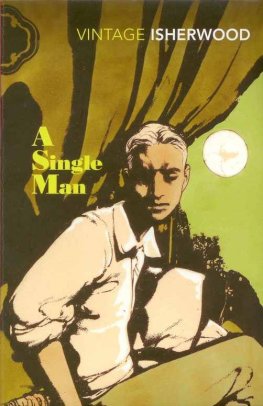CHRISTOPHER ISHERWOOD
A Single Man
TO GORE VIDAL
Waking up begins with saying am and now. That which has awoken then lies for a while staring up at the ceiling and down into itself until it has recognised I, and therefrom deduced I am, I am now. Here comes next, and is at least negatively reassuring; because here, this morning, is where it had expected to find itself; whats called at home.
But now isnt simply now. Now is also a cold reminder; one whole day later than yesterday, one year later than last year. Every now is labelled with its date, rendering all past nows obsolete, until later or sooner perhaps no, not perhaps quite certainly: It will come.
Fear tweaks the vagus nerve. A sickish shrinking from what waits, somewhere out there, dead ahead.
But meanwhile the cortex, that grim disciplinarian, has taken its place at the central controls and has been testing them, one after another; the legs stretch, the lower back is arched, the fingers clench and relax. And now, over the entire intercommunication-system, is issued the first general order of the day: UP.
Obediently the body levers itself out of bed wincing from twinges in the arthritic thumbs and the left knee, mildly nauseated by the pylorus in a state of spasm and shambles naked into the bathroom, where its bladder is emptied and it is weighed; still a bit over 150 pounds, in spite of all that toiling at the gym! Then to the mirror.
What it sees there isnt so much a face as the expression of a predicament. Heres what it has done to itself, heres the mess it has somehow managed to get itself into, during its fifty-eight years; expressed in terms of a dull harassed stare, a coarsened nose, a mouth dragged down by the corners into a grimace as if at the sourness of its own toxins, cheeks sagging from their anchors of muscle, a throat hanging limp in tiny wrinkled folds. The harassed look is that of a desperately tired swimmer or runner; yet there is no question of stopping. The creature we are watching will struggle on and on until it drops. Not because it is heroic. It can imagine no alternative.
Staring and staring into the mirror, it sees many faces within its face the face of the child, the boy, the young man, the not-so-young man all present still, preserved like fossils on superimposed layers, and, like fossils, dead. Their message to this live dying creature is: Look at us we have died what is there to be afraid of?
It answers them: But that happened so gradually, so easily. Im afraid of being rushed.
It stares and stares. Its lips part. It starts to breathe through its mouth. Until the cortex orders it impatiently to wash, to shave, to brush its hair. Its nakedness has to be covered. It must be dressed up in clothes because it is going outside, into the world of the other people; and these others must be able to identify it. Its behaviour must be acceptable to them.
Obediently, it washes, shaves, brushes its hair; for it accepts its responsibilities to the others. It is even glad that it has its place among them. It knows what is expected of it.
It knows its name. It is called George.
By the time it has gotten dressed, it has become he; has become already more or less George though still not the whole George they demand and are prepared to recognise. Those who call him on the phone at this hour of the morning would be bewildered, maybe even scared, if they could realise what this three-quarters-human thing is that they are talking to. But, of course, they never could its voices mimicry of their George is nearly perfect. Even Charlotte is taken in by it. Only two or three times has she sensed something uncanny, and asked, Geo are you all right?
He crosses the front room, which he calls his study, and comes down the staircase. The stairs turn a corner; they are narrow and steep. You can touch both handrails with your elbows and you have to bend your head even if, like George, you are only five eight. This is a tightly planned little house. He often feels protected by its smallness; there is hardly room enough here to feel lonely.
Nevertheless
Think of two people, living together day after day, year after year, in this small space, standing elbow to elbow cooking at the same small stove, squeezing past each other on the narrow stairs, shaving in front of the same small bathroom mirror, constantly jogging, jostling, bumping against each others bodies by mistake or on purpose, sensually, aggressively, awkwardly, impatiently, in rage or in love think what deep though invisible tracks they must leave, everywhere, behind them! The doorway into the kitchen has been built too narrow. Two people in a hurry, with plates of food in their hands, are apt to keep colliding here. And it is here, nearly every morning, that George, having reached the bottom of the stairs, has this sensation of suddenly finding himself on an abrupt, brutally broken-off, jagged edge as though the track had disappeared down a landslide. It is here that he stops short and knows, with a sick newness, almost as though it were for the first time: Jim is dead. Is dead.
He stands quite still, silent, or at most uttering a brief animal grunt, as he waits for the spasm to pass. Then he walks into the kitchen. These morning spasms are too painful to be treated sentimentally. After them, he feels relief, merely. It is like getting over a bad attack of cramp.
Today, there are more ants, winding in column across the floor, climbing up over the sink and threatening the closet where he keeps the jams and the honey. Doggedly, he destroys them with a Flit-gun and has a sudden glimpse of himself doing this; an obstinate, malevolent old thing imposing his will upon these instructive and admirable insects. Life destroying life before an audience of objects pots and pans, knives and forks, cans and bottles that have no part in the kingdom of evolution. Why? Why? Is it some cosmic enemy, some arch-tyrant who tries to blind us to his very existence by setting us against our natural allies, the fellow-victims of his tyranny? But, alas, by the time George has thought all this, the ants are already dead and mopped up on a wet cloth and rinsed down the sink.
He fixes himself a plate of poached eggs, with bacon and toast and coffee, and sits down to eat them at the kitchen table. And meanwhile, around and around in his head, goes the nursery jingle his Nanny taught him when he was a child in England, all those years ago:
Poached eggs on toast are very nice
(He sees her so plainly still, grey-haired with mouse-bright eyes, a plump little body carrying in the nursery breakfast-tray, short of breath from climbing all those stairs. She used to grumble at their steepness and call them The Wooden Mountains one of the magic phrases of his childhood.)
Poached eggs on toast are very nice,
If you try them once youll want them twice!
Ah, the heartbreakingly insecure snugness of those nursery pleasures! Master George enjoying his eggs; Nanny watching him and smiling reassurance that all is safe in their dear tiny doomed world!
Breakfast with Jim used to be one of the best times of their day. It was then, while they were drinking their second and third cups of coffee, that they had their best talks. They talked about everything that came into their heads including death, of course, and is there survival, and, if so, what exactly is it that survives. They even discussed the relative advantages and disadvantages of getting killed instantly and of knowing youre about to die. But now George cant for the life of him remember what Jims views were on this. Such questions are hard to take seriously. They seem so academic.
Just suppose that the dead do revisit the living. That something approximately to be described as Jim can return to see how George is making out. Would this be at all satisfactory? Would it even be worth while? At best, surely, it would be like the brief visit of an observer from another country, who is permitted to peep in for a moment from the vast outdoors of his freedom and see, at a distance, through glass, this figure who sits solitary at the small table in the narrow room, eating his poached eggs humbly and dully, a prisoner for life?









